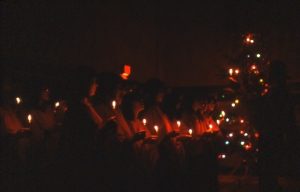HOMILY ADVENT SUNDAY 3-B
Be Light and Joy to a Dark World
(Isaiah 61:1-2a, 10-11; Luke 1; 1 Thessalonians 5:16-24; John 1:6-8, 19-28)
****************************************************************
When the British took over Ireland in the 17th century, Catholicism was suppressed and priests had to minister on the run. British soldiers began persecuting the “Roman faith,” as they put it. Before Christmas, however, some families would place candles in their windows. When asked why by the suspicious British soldiers, they replied they were an invitation to Joseph, Jesus and Mary looking for a home, indicating they would be welcome there. The soldiers dismissed this practice as superstition and let them be. In reality, the candles were signs that a priest would find a safe place where he could celebrate Mass on that sacred night.
 This third Sunday of Advent invites us to let our lights be more than decorations, but rather lights announcing the dawning of a new day of liberation and joy, and a real welcome for the Spirit of Christ in our hearts and homes. We are asked to be light and joy to a world that lies in increasingly greater darkness.
This third Sunday of Advent invites us to let our lights be more than decorations, but rather lights announcing the dawning of a new day of liberation and joy, and a real welcome for the Spirit of Christ in our hearts and homes. We are asked to be light and joy to a world that lies in increasingly greater darkness.
“I will greatly rejoice in the Lord”; “My spirit rejoices in God my Saviour”; “Rejoice always” – these lines from the readings makes this Gaudate Sunday, or a Sunday of Joy, a long-standing tradition in the Church. They remind us that faith in Jesus leads to transformation and joy
The prophet Isaiah, in the first reading, speaks words of hope, faith, transformation and even joy, out of an experience of disaster, exile and destruction. God will come to his people and set them free, he assures his readers. And then he calls for year of the Lord’s favour. This Jubilee year of favour is based on the Jewish notion of Sabbath. The word Jubilee comes from the Jewish word, Yobel. A yobel is the ram’s horn that is blown to announce this year of solemn atonement.
We need to remember the Jewish focus on atonement for exploitation, sin, abuse – for what has gone wrong. For the Jewish people, every 7th day was Sabbath. Every 7th year was a sabbatical year. A Jubilee year occurred every fifty years, after 7 series of 7 years, or 49 years. The Jubilee year was a year of concern for others, the weak especially, and a year of liberation, of release, of setting free and of rest for the land. Finally, all this is to prepare us for an eternity of Jubilee, an eternal Sabbath with God, of full liberation, peace and joy.
Isaiah hints that this joyful reality is not only a future hope, but meant to be a present reality, as he assures us that God clothes us with salvation and righteousness, like a wedding garment. And so, we are to be witnesses of hope and liberation to others, for the Spirit of the living God will be upon us.
The Gospel takes us to that joyful reality breaking into the present. Jesus, the Messiah, the one who was to come, is at hand. In preparation, John the Baptist calls for reform, change, and testifies to the light. The poor, the lowly, those who are able to repent, to be open to the coming of the Lord, will rejoice and shine in the dark. The dark is the unbelief of the proud, the haughty, the unrepentant, here in the person of the priests and the scribes sent by the Pharisees to question John and resist him, rather than repent. Significantly, they are the ones who should have, but did not, recognize the Messiah present among them.
In his letter to the Thessalonians, St. Paul builds on the sentiments expressed by Isaiah. God’s will is being accomplished in Jesus. Peace and joy are the priceless gifts of the Holy Spirit. Grounded in faith in Jesus and filled with joy and gratitude, we are to be attentive to the Spirit and not quench the Spirit, as did the religious authorities at the time of Jesus. That same spirit will help us to recognize the Messiah in especially the poor and marginalized among us.
Someone who truly personified the spirit of Gaudate Sunday was Mary Jacobson, a widowed elder and mother of three sons who lived in Île-à-la-Crosse, SK. Crippled with rheumatoid arthritis and barely able to hobble around her small suite, she nevertheless was cheerful and full of life. She would delight in visits by a pastoral minister, pull out her Cree hymnbook, light candles, and receive communion with great faith and reverence. She would then thoroughly enjoy a short visit, laughing and chuckling over revered memories of times past. Her great concern was to pray all three of her sons into sobriety, which she did. One eventually became the director of the rehabilitation centre in the community at that time. For Mary, every day was Gaudate Sunday. She was truly a beacon of light and a source of joy to all who knew her.
The Eucharist is a joyful meal helping us remember and celebrate the fulfilment of the promise of the Prophet Isaiah in Jesus Christ, the one who was, who came, and will come again.
As we wait for the day of his final coming, and prepare to celebrate his coming in the flesh, let us recognize and celebrate his presence in us today through the Spirit. May that Spirit empower us to be light and joy to a world that still lives in darkness.



